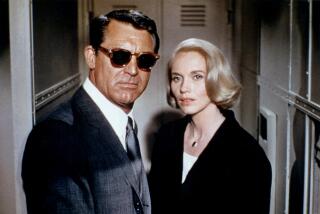A Satirical Jab at the Law and the Media
- Share via
Peter Lefcourt’s latest satirical novel begins with a very domestic, very private scene, the kind that requires doors to be locked and shades drawn. A cross-dressing Schenectady, N.Y., urologist, Ernie Haas, is making love to his wife, Audrey. He is wearing some of her clothes--they are both a “perfect size 8.” She is standing up. He has manacled her to the kitchen stove with padded red handcuffs ordered from a Santa Monica specialty store. She is watching the Home Shopping Network on TV.
Suddenly, Ernie dies of a heart attack. To escape his crushing embrace, Audrey, inspired by an appliance ad on the tube, severs his penis with an electric carving knife. Ernie collapses to the floor, but the naked, weeping Audrey remains bound by the handcuffs. This stark tableau is witnessed by Emmanuel Longhouse, a deaf-mute Native American burglar, who breaks into the house despite the presence of the Haases’ Rottweiler, Siggy.
In Longhouse’s eyes, Audrey is a depraved killer. He refuses to unlock her, and gives her lasagna and Diet Coke only so she won’t cheat justice by starving. He steals the knife. The other key piece of evidence--Ernie’s “tomahawk”--is missing; Longhouse suspects that Siggy made off with it. It is Longhouse who alerts the police by fax.
Before long, the peculiarities of the Haases’ love life are anything but private. The innocent but chronically depressed and airheaded Audrey is charged with murder, hailed by her lawyer as a feminist heroine and compared by wincing males to the vengeful Lorena Bobbitt. The result: a full-blown media circus, which is Lefcourt’s real subject.
In previous novels (“The Dreyfus Affair,” “The Deal,” “Di and I”), Lefcourt dealt with Hollywood, tabloid royalty and the shock to baseball’s image when a major league shortstop falls openly in love with his second baseman. He is a resident of Los Angeles, a fellow breather of our O.J.-saturated atmosphere. So it’s no surprise that he should turn here to examine the mindless process that inflates the Haas case into a “trial of the decade.”
“What had started off as a little apres-Chinese-food frolic” in a suburban home “became a cause celebre that polarized the country and made the 38-year-old Schenectady housewife the biggest media star since Princess Di. Who, when asked her opinion of the case, replied, ‘Well, it is going to a bit of an extreme actually, isn’t it?’ ”
Besides being a very funny writer, Lefcourt knows a lot about how the law and the media work--not to mention how, when they get together, their ostensible efforts to dig up the truth only succeed in burying it under piles of Siggy-doo.
The basic situation in “Abbreviating Ernie” is farfetched, but the steps by which it escalates out of everyone’s control are disconcertingly plausible. Lefcourt’s district attorney is overbearing, his feminists stereotypically humorless, but he needs no villains to make his point. Politicians, judges, “spin guys,” TV-movie producers, instant-book publishers, celebrities like Dan Rather and little people hoping to cash in on their moment of fame--all are just carried along for the ride.
If the novel has a hero, it’s Barney Abelove, a rumpled homicide detective who keeps running down clues after anyone else would have abandoned the case. Yet--this is typical of Lefcourt’s irony--the detective is mistaken, and all his hard work nearly leads to disaster. When justice is done to Audrey in the end, it happens more or less by accident.
Lefcourt offers no cure for the excesses he parodies. And although the laughs don’t stop, he seems to realize by the second half of “Abbreviating Ernie” that, with Ernie dead and Audrey terminally dim, the human center of his story is being obscured by the spinoffs--exactly the kind of thing he’s supposed to be parodying.
So he introduces two characters, People magazine reporter Carl Furillo (named after the former Dodger) and “Hard Copy” reporter Lilian Wong, who discover that good, old-fashioned romance can be more of a thrill than chasing scoops with a cell phone and a laptop--a scenario even more mind-boggling, in this context, than what went on in the Haases’ kitchen.
More to Read
Sign up for our Book Club newsletter
Get the latest news, events and more from the Los Angeles Times Book Club, and help us get L.A. reading and talking.
You may occasionally receive promotional content from the Los Angeles Times.







